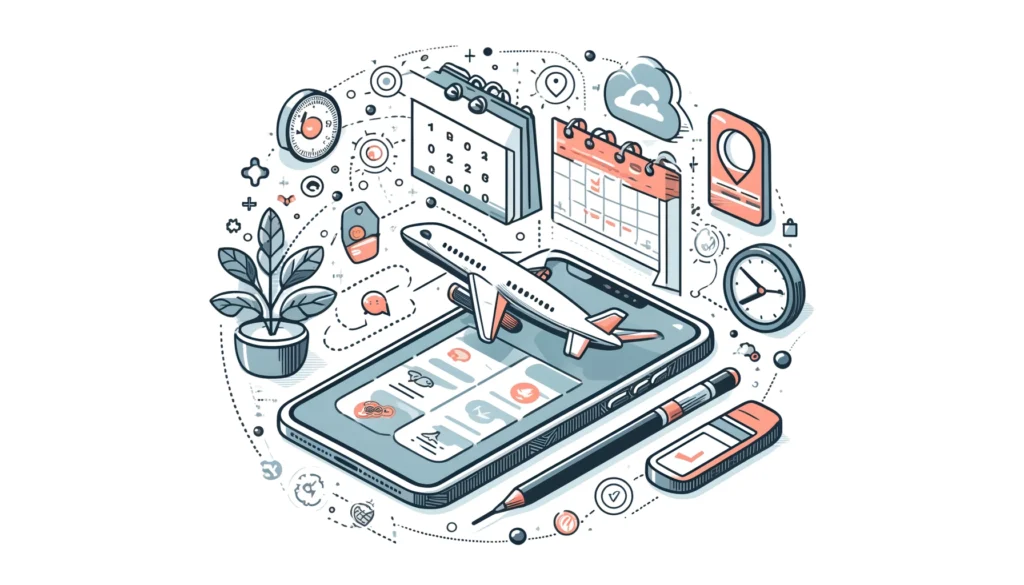Revolutionizing Travel:

Introduction to AI in Travel
In today’s fast-paced world, Artificial Intelligence (AI) has transformed the travel industry. AI helps create personalized travel experiences, streamlines booking processes, and manages itineraries seamlessly. By leveraging AI, travelers can enjoy a stress-free, customized journey. The integration of AI into travel services marks a significant shift from traditional methods, bringing forth a new era of convenience and efficiency.
Personalized Itinerary Planning
AI excels in analyzing vast amounts of data, including user preferences, past travel history, and even social media activity. This data analysis helps create personalized itineraries that suit individual preferences. Tools like Trip Planner AI and Tripnotes generate detailed travel plans based on user inputs, ensuring each trip is unique. With AI, the days of generic, one-size-fits-all itineraries are over.
Key Features:
- Tailored suggestions: AI considers user interests to recommend activities and destinations.
- Preference-based activities: Travelers receive recommendations based on their likes and dislikes.
- Detailed daily plans: Each day is planned meticulously, ensuring a balanced mix of activities and relaxation.
Integrated Booking Systems
AI-powered platforms integrate various booking services, making the process smoother. Users can book flights, hotels, and activities all in one place. Platforms like World Trip Deal use AI to negotiate exclusive deals, ensuring luxurious yet budget-friendly experiences. This consolidation simplifies the planning process, allowing travelers to focus on enjoying their trip.
Benefits:
- Streamlined bookings: No need to visit multiple websites; everything is available in one place.
- Exclusive deals: AI can find and negotiate better deals than human agents.
- One-stop booking solution: All travel arrangements are managed through a single platform, reducing stress and confusion.
Real-Time Updates and Recommendations
AI provides real-time updates on travel restrictions, weather conditions, and flight schedules. This ensures travelers stay informed about any changes that might affect their plans. Tools like Tripbot offer real-time recommendations and quick responses, enhancing the travel experience by adapting to real-time conditions. This dynamic approach keeps travelers flexible and informed.
Advantages:
- Up-to-date information: Receive immediate notifications about any changes or alerts.
- Immediate recommendations: AI suggests alternative plans if disruptions occur.
- Adaptable itineraries: Plans can be adjusted on the fly, ensuring a smooth travel experience.
Expense Management
Managing travel expenses can be challenging. AI tools like Trip Planner AI offer expense tracking features, helping travelers stay within budget by providing detailed insights into their spending patterns during the trip. This financial oversight ensures that travelers can enjoy their journey without worrying about overspending.
Expense Tracking:
- Budget management: Set and adhere to a budget for the entire trip.
- Detailed expense reports: Track spending in real-time and review reports.
- Alerts for overspending: Receive notifications if spending exceeds the set budget.
Dynamic Pricing and Smart Shopping
AI algorithms analyze market trends, supply and demand, and other factors to offer dynamic pricing. This helps travelers find the best deals and make cost-effective decisions. AI-driven platforms suggest the best times to book flights or hotels based on historical data. This strategic approach can significantly reduce travel costs.
Key Aspects:
- Optimal booking times: Identify the best times to book to secure the lowest prices.
- Cost-effective deals: AI finds the most economical options without compromising on quality.
- Market trend analysis: Stay ahead of pricing trends to avoid overpaying.
Language Translation and Localization
Traveling to non-English speaking countries can be daunting due to language barriers. AI-powered translation tools and chatbots provide real-time language assistance, making it easier for travelers to navigate foreign destinations and interact with locals. This capability enhances the travel experience by breaking down communication barriers.
Benefits:
- Real-time translation: Translate languages instantly to understand signs, menus, and conversations.
- Enhanced communication: Engage more effectively with locals.
- Cultural integration: Gain deeper insights into local customs and traditions.
Customer Support and Virtual Assistants
AI chatbots and virtual assistants offer 24/7 customer support, handling inquiries, booking changes, and cancellations efficiently. These tools enhance customer service by providing quick and accurate responses, thus improving overall travel satisfaction. With AI, travelers can receive assistance at any time, from any location.
Features:
- Round-the-clock support: Access help whenever needed, day or night.
- Efficient problem resolution: AI quickly resolves common issues, ensuring a smooth experience.
- Multichannel availability: Get support through various platforms like chat, email, or phone.
Automated Upgrades and Add-Ons
AI can suggest personalized upgrades and add-ons, such as VIP experiences or exclusive tours, based on user preferences and travel patterns. This not only enhances the travel experience but also helps travel companies increase their revenue through upselling. Personalized recommendations ensure that travelers receive offers they are likely to appreciate and utilize.
Highlights:
- Personalized recommendations: AI suggests upgrades tailored to the traveler’s interests.
- VIP experience options: Enjoy exclusive tours, private guides, and luxury accommodations.
- Revenue enhancement: Travel companies can boost profits through targeted upselling.
Travel Safety and Emergency Assistance
AI tools can provide travelers with safety information, such as local health advisories, crime rates, and emergency contacts. This ensures that travelers are well-prepared and can handle any unforeseen situations during their trip. AI-driven safety features enhance traveler confidence and security.
Safety Features:
- Health advisories: Stay informed about local health conditions and precautions.
- Emergency contacts: Quickly access essential contact information in case of emergencies.
- Safety alerts: Receive real-time notifications about safety concerns or incidents.
Sustainable Travel
AI promotes sustainable travel practices by suggesting eco-friendly accommodations and activities. Travel platforms can use AI to provide carbon offset options, encouraging travelers to make environmentally conscious decisions. This focus on sustainability aligns with the growing trend of responsible tourism.
Sustainable Options:
- Eco-friendly accommodations: Stay at hotels that prioritize sustainability.
- Carbon offset programs: Reduce the environmental impact of travel.
- Green travel suggestions: Choose activities that are both enjoyable and environmentally friendly.
Post-Trip Engagement and Feedback
After the trip, AI can engage travelers by collecting feedback through automated surveys. This helps travel companies improve their services and maintain a connection with their customers for future trips. Continuous feedback loops ensure that services evolve to meet traveler needs better.
Post-Trip Benefits:
- Feedback collection: Gather insights on traveler experiences.
- Service improvement: Use feedback to enhance future offerings.
- Customer retention: Maintain a relationship with travelers, encouraging repeat business.
Enhancing User Experience
AI ensures a seamless user experience by integrating various travel services into a single platform. This reduces the complexity of travel planning and makes the entire process enjoyable and stress-free. By centralizing services, AI simplifies every aspect of travel, from planning to post-trip engagement.
User Experience:
- Integrated services: Access all travel needs through one platform.
- Simplified planning: Reduce the hassle of organizing multiple elements.
- Enjoyable process: Focus on the fun parts of travel, leaving the logistics to AI.
Future of AI in Travel
The future of AI in travel looks promising, with continuous advancements expected to further enhance personalization, efficiency, and user experience. AI will likely play an even more significant role in real-time itinerary adjustments, mood-based recommendations, and more intuitive user interfaces. As technology evolves, so will the capabilities of AI in the travel sector.
Future Trends:
- Real-time adjustments: AI adapts plans based on real-time factors like weather and traffic.
- Mood-based suggestions: Receive recommendations that match your current mood or preferences.
- Advanced user interfaces: Enjoy more intuitive and user-friendly platforms.
Case Studies and Success Stories
Case Study: Tripnotes
Tripnotes has revolutionized how people plan their travels by providing personalized recommendations and detailed itineraries. A user-friendly interface and real-time updates make it a favorite among travelers. One success story involves a family planning a trip to Europe. Using Tripnotes, they received tailored suggestions for kid-friendly activities and local dining options. This level of customization resulted in a memorable and stress-free vacation.
Case Study: World Trip Deal
World Trip Deal leverages AI to curate personalized, luxurious experiences within a reasonable budget. One notable success story is a solo traveler who wanted a unique adventure without breaking the bank. World Trip Deal used AI to analyze her travel history and preferences, securing exclusive deals on boutique hotels and off-the-beaten-path activities. This resulted in a distinctive and budget-friendly trip that exceeded her expectations.
Success Story: AI-Powered Chatbots at Airports
Airports like Lyon and Frankfurt have implemented AI-powered chatbots to assist travelers with various needs, from checking flight status to locating amenities. These chatbots have significantly improved the travel experience by providing quick and accurate information. One traveler recounted how the chatbot helped her navigate a tight connection by providing real-time updates and directions, ensuring she made her flight on time.
Conclusion
By leveraging AI, travelers can enjoy a more personalized, efficient, and enjoyable travel experience. From planning and booking to real-time updates and post-trip engagement, AI offers numerous benefits that make travel more accessible and enjoyable for everyone. The integration of AI into travel services represents a significant leap forward in the industry, promising an even brighter future for travelers and travel companies alike.





